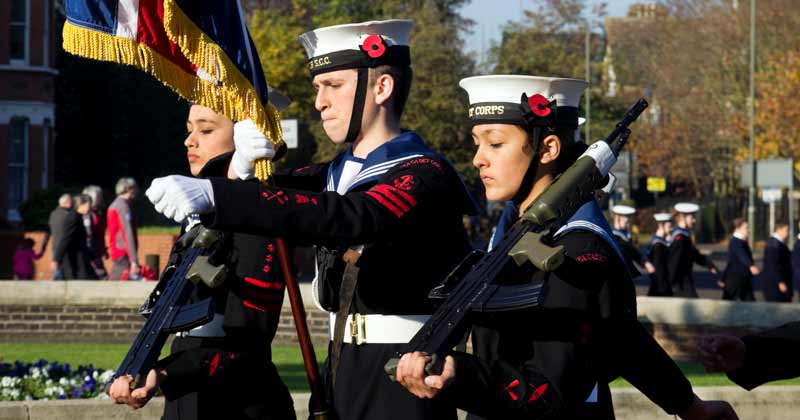The government should expand in-school cadet forces by 30 per cent by 2030, its defence review said, less than a year after the Department for Education cut funding.
The review also said government should set an ambition to have 250,000 cadets – both in school and community forces – in the “longer term”.
But the Ministry of Defence insisted that government and private funding would be needed to support the expansion. The Department for Education recently slashed £1.1 million from a scheme set up to do just that.
The government has accepted all of the review’s recommendations, but plans for the expansion as well as any funding arrangements have not been finalised. The MoD has said it is working closely with the DfE.
According to government statistics, there are around 51,000 pupils in the school-based “combined cadet force”. There are also more than 88,000 community cadets.
Reaching the government’s 30 per cent expansion target by 2030 would require roughly an additional 15,300 school-based cadets.
School-based cadets represent 36.6 per cent of those nationally. If they were to continue to make up the same proportion under the government’s longer-term ambition, their numbers would have to rise around 79 per cent, to over 91,000.
Government ‘all over the place’ on funding
But last year, the Department for Education scrapped £1.1 million in funding it contributed to a programme aimed at expanding cadet forces in schools, citing “difficult choices” about the financial situation the Labour government had inherited.

According to the House of Commons Library, MoD funding has continued, with £3.6 million allocated in 2024-25.
Neil O’Brien, the shadow education minister, told Schools Week: “The defence review calls for cadet expansion but the DfE recently cut funding for cadet expansion. The government is all over the place.
“The have cut funding for maths, physics, Latin, computing and for behaviour hubs, and left schools with a £400 million black hole as a result of their broken promise to fund the national insurance increase.
“It’s all making it harder for teachers to do things that add real value for children”
The DfE was approached for comment.
Where will schools find the staff?
There are also concerns about staff availability to support expansion of cadet forces.
A MoD-funded evaluation of school cadet forces found pupils participating had “significantly lower levels of absence”. Schools also reported “positive outcomes associated with the CCF contingent”.
Leaders viewed having cadet forces as “a significant resource investment, but one that was a good investment for the school to make”. The report also noted “concerns about the turnover of CCF adult volunteers”.
John Howson, a teacher recruitment expert, said to achieve its goal the government would need around 7 per cent of the secondary population enrolled, or 10 per cent of older pupils if years 7 and 8 are discounted.
“If this happens then there is going to be a need for a whole lot of new staff in areas where the schools have been failing to meet recruitment targets for teaching staff for years,” he warned in a blog post.
In its review, the MoD said there should also be a “greater focus within the cadets on developing STEM (science, technology, engineering, mathematics) skills and exploring modern technology.
“Defence, wider government, and partnerships with the private sector must provide appropriate leadership, support and funding to deliver this expansion.”
Howson said this suggested “a new body might need to be set up to deliver the aims, especially if all the groups mentioned are to be brought together.
“Would such a new body be led by the MoD, and how will the new community groups recruit the staff for evening and weekend sessions when these days volunteer organisations are regularly struggling to find youth workers?”
‘Make cadets part of mainstream school life’
A recent report from The New Britain Project concluded the combined cadet force “can deliver real and lasting benefits, for pupils, schools, and wider society, particularly when it is well embedded and properly supported”.
But just 1 in 13 state secondary schools currently offer a cadets programme, with around 80 schools “stuck on a waiting list to join”.
Polling by the think tank also found 55 per cent of the public supported expanding cadet forces to more schools, with most respondents believing this would boost young people’s health and build a “greater sense of national duty”.
Anna McShane, director of The New Britain Project. “The recommendation from the MoD to expand cadet forces is welcome – but the real case for cadets isn’t just about defence – it’s about helping young people thrive.
“In the wake of Covid, schools need more tools to re-engage pupils and rebuild a sense of purpose. Cadets do just that.
“Our ambition should be to see them become a mainstream part of school life – alongside more music, sport and Duke of Edinburgh awards – helping young people grow in confidence and belonging.”







Your thoughts